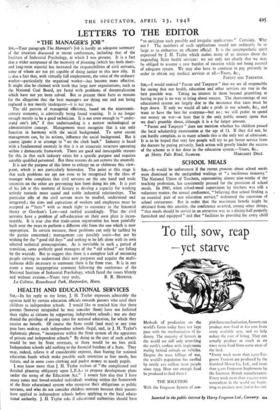LETTERS TO THE EDITOR
"THE MANAGER'S JOB" •
Sm,—Your paragraph The Manager's 7ob is hardly an adequate summary of the situation discussed at recent conferences, including that of the
Institute of Industrial Psychology, at which I was present. It is a fact that a wider acceptance of the necessity of planning (which has both short- and long-term aspects) has increased the responsibilities of civil servants, some of whom are not yet capable of doing justice to this new role. It i; also a fact that, with virtually full employment, the voice of the ordinary worker—particularly the organised worker—has become more effective.
It might also be claimed with truth that large new organisations, such as the National Coal Board, are faced with problems of decentralisation which have not yet been solved. But to present these facts as reasons for the allegation that the best managers are dying out and not being replaced is not merely inadequate—it is not true.
The old pattern of managerial efficiency, based on the nineteenth- century economy, is admittedly being found wanting. It is no longer enough merely to be a good technician_ It is not even enough to " under- stand one's job," if that understanding is a narrow technological or administrative concept. Management must recognise that it can only function in harmony with the social background. To some extent management can, by its actions, influence the social background. But it cannot ignore it or attempt to " set the clock back." Industry is faced with a fundamental anomaly in that it is an autocratic structure operating within a democratic framework. There are good and inescapable reasons for this in that each industry exists for a specific purpose and requires suitably qualified personnel. But these reasons do not remove the anomaly.
It is not the purpose of this letter to enlarge on or elaborate this view- point, which is not particularly heterodox. The point at this stage is that such problems are apt not even to be recognised by the class of manager who complains that civil servants on the one hand and trade unionists on the other are preventing him from doing his job. It is part of his job at this moment of history to develop a capacity for working actively towards more sound and stable industrial relationships. The particular ride of the civil servant must be studied, understood and integrated ; the aims and aspirations of workers and employees must be accepted as -" facts " with as much right to existence as the binomial theory or Gresham's Law—and tackled accordingly. That the civil servants have a problem of self-education on their own plate is incon- testable. It is true also that trade-union organisation has been painfully built over the years to perform a different role from the one which is now appropriate. In certain measure, these problems can only be tackled by the parties concerned ; management can possibly assist—but not by wishing for the " good old days " and seeking to be left alone with its own selected technical preoccupations. As is inevitable in such a period of transition, some perfectly good managers of the " old school" are falling by the wayside. But to suggest that there is a complete lack of oncoming people striving to understand their new purposes and acquire the multi- tudinous skills necessary to surmount them is far from true. It is in any event a most inappropriate comment following the conference of the National Institute of Industrial Psychology, which faced the issues bluntly
and without evasion.—Yours very truly, R. It HOPKINS. La Collette, Roundwood Park, Harpenden, Herts.


































 Previous page
Previous page